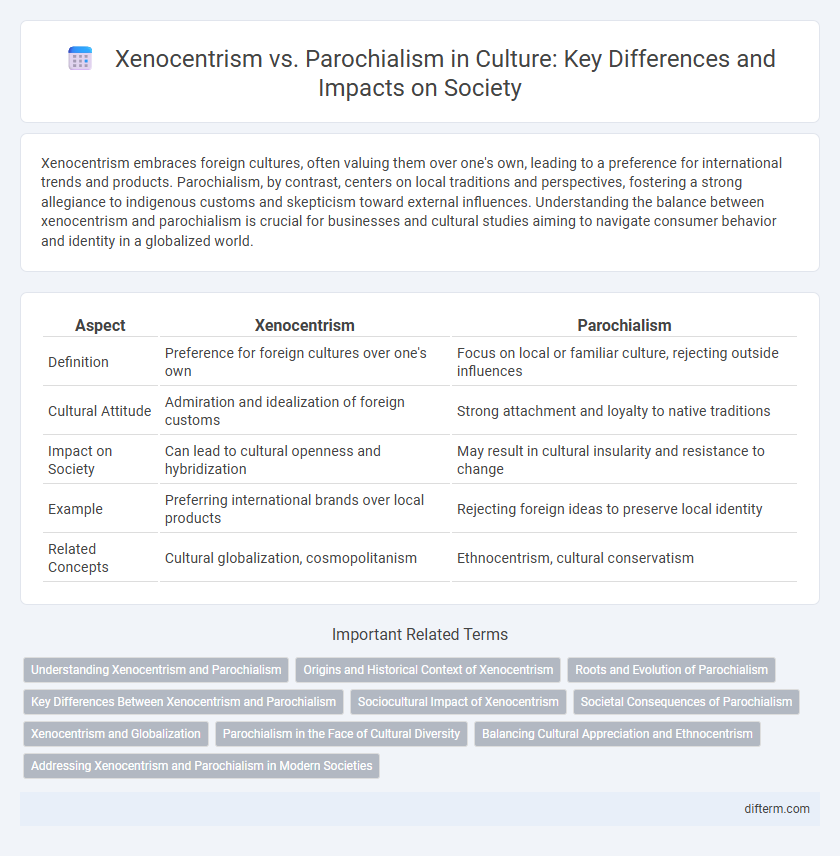Xenocentrism embraces foreign cultures, often valuing them over one's own, leading to a preference for international trends and products. Parochialism, by contrast, centers on local traditions and perspectives, fostering a strong allegiance to indigenous customs and skepticism toward external influences. Understanding the balance between xenocentrism and parochialism is crucial for businesses and cultural studies aiming to navigate consumer behavior and identity in a globalized world.
Table of Comparison
| Aspect | Xenocentrism | Parochialism |
|---|---|---|
| Definition | Preference for foreign cultures over one's own | Focus on local or familiar culture, rejecting outside influences |
| Cultural Attitude | Admiration and idealization of foreign customs | Strong attachment and loyalty to native traditions |
| Impact on Society | Can lead to cultural openness and hybridization | May result in cultural insularity and resistance to change |
| Example | Preferring international brands over local products | Rejecting foreign ideas to preserve local identity |
| Related Concepts | Cultural globalization, cosmopolitanism | Ethnocentrism, cultural conservatism |
Understanding Xenocentrism and Parochialism
Xenocentrism involves a preference for foreign cultures, often valuing them above one's own cultural practices, which can impact identity and social integration. Parochialism reflects a narrow focus on local traditions and resistance to outside influences, shaping attitudes toward cultural diversity. Understanding these opposing cultural orientations is essential for navigating globalization and intercultural communication dynamics.
Origins and Historical Context of Xenocentrism
Xenocentrism originates from societies historically exposed to extensive cross-cultural interactions, such as trade, colonization, and migration, where foreign customs and products were often idealized over indigenous ones. In contrast to parochialism's inward-looking mindset, xenocentrism reflects a preference rooted in perceived superiority or novelty of external cultures, often emerging during periods of cultural upheaval or modernization. This phenomenon has been documented in various historical contexts, including post-colonial societies and developing nations, where admiration for foreign lifestyles and technologies symbolizes progress or cosmopolitanism.
Roots and Evolution of Parochialism
Parochialism originates from the Latin word "parochia," meaning a parish or local district, and its evolution reflects a preference for familiar social and cultural norms within closely-knit communities. Historically, it emerged as a survival mechanism, prioritizing trust and cohesion by limiting interactions to known groups, which reinforced local identity and resistance to external influences. Over time, parochialism became deeply embedded in cultural frameworks, contrasting sharply with xenocentrism's admiration for foreign cultures and highlighting a persistent tension in global cultural dynamics.
Key Differences Between Xenocentrism and Parochialism
Xenocentrism prioritizes foreign cultures, valuing them above one's own, often driven by admiration or perceived superiority. In contrast, parochialism reflects a narrow, inward-looking perspective, favoring local traditions and resisting external influences. These opposing attitudes influence cross-cultural interactions, shaping openness to diversity and global integration.
Sociocultural Impact of Xenocentrism
Xenocentrism, the preference for foreign cultures over one's own, significantly shapes social identities and cultural dynamics by fostering admiration and adoption of external customs, technologies, and values. This phenomenon can lead to cultural hybridity, enhancing creativity and global interconnectedness while also risking erosion of indigenous traditions and self-esteem within communities. Socioculturally, xenocentrism influences consumer behavior, language use, and social norms, reflecting complex power relations in globalization and cross-cultural exchanges.
Societal Consequences of Parochialism
Parochialism fosters societal fragmentation by limiting exposure to diverse cultures and ideas, which can hinder social cohesion and innovation. Communities with parochial mindsets often exhibit resistance to change, reinforcing stereotypes and perpetuating cultural insularity. This cultural narrowness can impede economic development and exacerbate social tensions in increasingly globalized societies.
Xenocentrism and Globalization
Xenocentrism, the preference for foreign cultures over one's own, intensifies as globalization accelerates cultural exchange and interconnectedness. This phenomenon drives consumers and societies to idealize foreign products, lifestyles, and values, often perceiving them as superior to domestic alternatives. The global flow of media, technology, and goods reinforces xenocentric attitudes, shaping cultural identity and consumption patterns worldwide.
Parochialism in the Face of Cultural Diversity
Parochialism manifests as a cultural mindset where individuals prioritize local customs and perspectives, often resisting foreign influences despite increasing globalization. This inward-looking stance can hinder cross-cultural understanding and limit the benefits derived from cultural diversity in multinational environments. Organizations and societies exhibiting parochialism may struggle with adaptability, innovation, and effective intercultural communication amid diverse cultural landscapes.
Balancing Cultural Appreciation and Ethnocentrism
Xenocentrism involves valuing foreign cultures over one's own, while parochialism reflects a narrow focus on local customs and traditions. Balancing cultural appreciation requires recognizing the strengths and uniqueness of multiple cultures without diminishing one's own heritage. Fostering intercultural understanding helps mitigate ethnocentrism, encouraging respect for diversity alongside cultural pride.
Addressing Xenocentrism and Parochialism in Modern Societies
Addressing xenocentrism and parochialism in modern societies requires fostering cultural awareness through education and inclusive policies that celebrate diversity while acknowledging local traditions. Encouraging intercultural dialogue and promoting global interconnectedness can reduce biases associated with both excessive admiration of foreign cultures and rigid preference for local customs. Implementing community programs that balance global influences with respect for indigenous values strengthens social cohesion and mutual understanding.
xenocentrism vs parochialism Infographic

 difterm.com
difterm.com